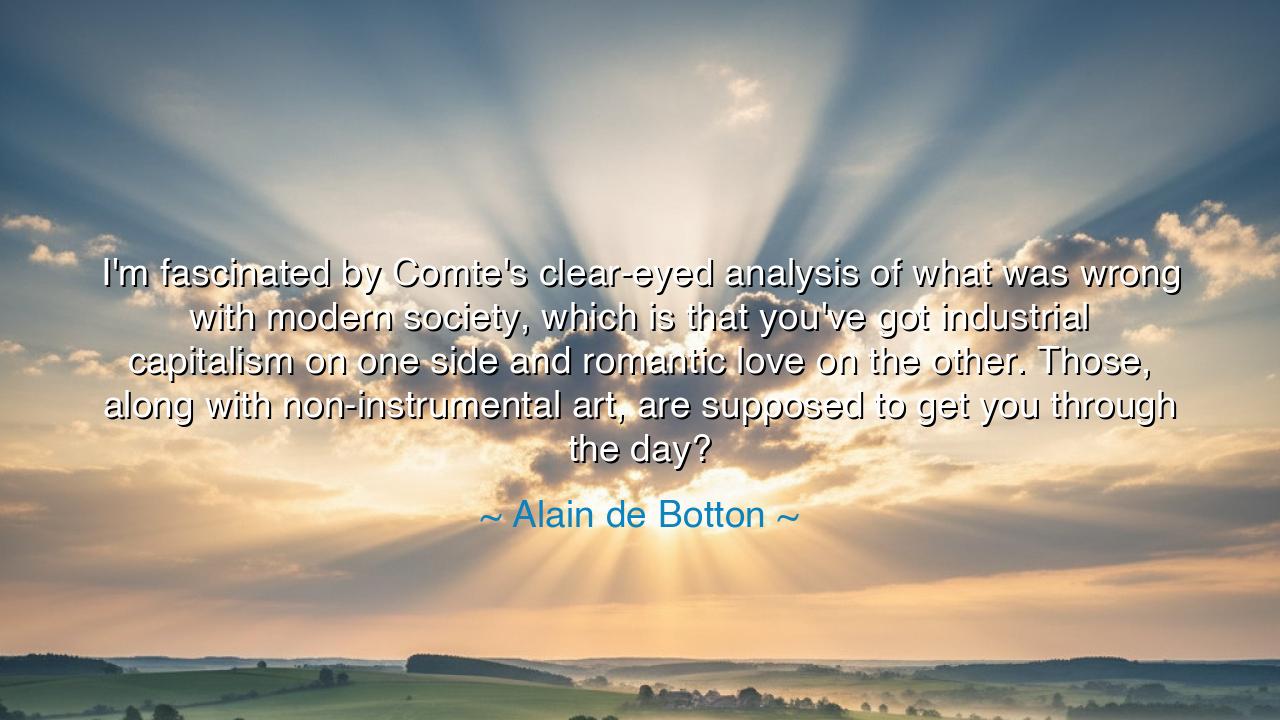
I'm fascinated by Comte's clear-eyed analysis of what was wrong
I'm fascinated by Comte's clear-eyed analysis of what was wrong with modern society, which is that you've got industrial capitalism on one side and romantic love on the other. Those, along with non-instrumental art, are supposed to get you through the day?






Hear now the words of Alain de Botton, who, gazing upon the wisdom of Auguste Comte, revealed a piercing truth about the world we inhabit: “I’m fascinated by Comte’s clear-eyed analysis of what was wrong with modern society, which is that you’ve got industrial capitalism on one side and romantic love on the other. Those, along with non-instrumental art, are supposed to get you through the day?” In these words lies both sorrow and awakening. For he names the pillars upon which modern humanity leans—work, love, and art—yet asks whether they are enough to bear the full weight of the human soul.
In ages past, humanity sought meaning not in factories or fleeting passions, but in the temples of gods, the rites of the tribe, the wisdom of elders, and the great bonds of kinship. But in the modern age, the thundering machine of industrial capitalism demands long hours of toil, reducing men and women to instruments in a vast, unfeeling system. And when the day’s labor ends, the soul is told to find its salvation in romantic love—a single heart, expected to heal all wounds and bear all burdens. Then, as if this were not enough, we are told to turn to art, stripped of practical purpose, to provide the balance our spirits crave. Comte, and de Botton after him, ask: can these fragile offerings sustain us, when the soul longs for deeper roots?
Consider the tale of the laborers in 19th-century Manchester, England, who toiled in the great textile mills. Their bodies bent under the smoke and clamor of the machines, their children grew pale in the shadows of chimneys, and their days blurred into endless repetition. What relief was offered them? A stolen hour with a beloved, a painting glimpsed in a church, a song sung in a tavern. Yet could such fragile oases truly balance the crushing weight of their existence? It is no wonder that many turned to religion, to movements, to revolutions, for their spirits knew instinctively that industrial capitalism and romantic love alone could not suffice.
And yet, even in our own time, the pattern persists. The modern worker wakes to the glowing screen, labors to fill quotas and satisfy abstract markets, and is told that the emptiness within can be filled by finding “the One,” or by gazing upon art that has been stripped of ritual and sacredness. De Botton, in echoing Comte, warns us that we are asking too much of too little. Romantic love is powerful, but it falters under the weight of all human longing. Art can inspire, but it is no substitute for community, for shared meaning, for a vision of life greater than the self.
Let us recall the story of Marcus Aurelius, the Roman emperor-philosopher. Surrounded by war, disease, and betrayal, he did not rely solely on the comforts of love or the distractions of art. Instead, he turned to philosophy—to the discipline of the Stoic path—which gave him strength to endure. His heart knew what Comte declared centuries later: that human beings require a broader framework, a moral and spiritual scaffolding, upon which to rest the burdens of life. To lean only on fleeting passions is to build a house upon shifting sands.
What then is the lesson? We must honor love and cherish art, yet we must not demand that they bear all the labor of the soul. Nor can we surrender ourselves wholly to the iron chains of capitalism, which treats us as cogs and not as seekers of truth. Instead, we must seek balance—through philosophy, through community, through spiritual practice, through rituals that bind us to something greater than ourselves. We must weave together the strands of work, love, art, wisdom, and shared belonging into a fabric strong enough to hold the human heart.
Therefore, children of tomorrow, do not be deceived into thinking that the world has given you enough merely because you have a career, a partner, and a gallery of paintings to admire. These are gifts, yes, but they are not the whole of meaning. Make time for reflection, for service, for silence beneath the stars. Gather with others not only to consume, but to create bonds of kinship and trust. Let love be freed from the burden of being your sole salvation. Let art be not just decoration, but a portal to truth. Let work be not your master, but your servant. In this way, you will restore balance, and walk the earth not as one lost in the shadows of modernity, but as one who has kindled the ancient flame of purpose.
And so the words of de Botton echo across the ages: he does not condemn love, nor art, nor labor, but rather calls us to awaken, to realize that the human soul needs more than fragments. It needs wholeness. And wholeness must be sought not in one pillar alone, but in the harmony of many.






AAdministratorAdministrator
Welcome, honored guests. Please leave a comment, we will respond soon